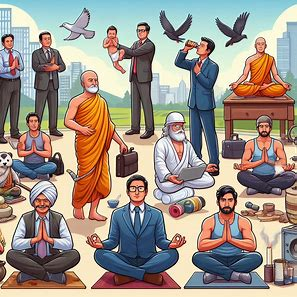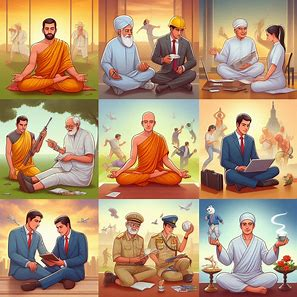Navigating Life's Challenges: Effective Strategies for Overcoming Problems
There is no sea
without waves, just as there is no life without problems. Everyone, regardless
of their socio-economic status, faces difficulties in their daily lives.
However, the nature and severity of these problems vary from person to person.
Understanding the Roots of Problems
Problems often stem
from differences in opinions and perspectives. No two people think alike all
the time, and this diversity of thought can lead to misunderstandings and
conflicts. Many of us are quick to believe that we are right and others are
wrong. When someone points out our mistakes or objects to our views, our pride
can prevent us from admitting our faults. This stubbornness can escalate into
unnecessary arguments and conflicts.
The Dynamics of Interpersonal Differences
We encounter people
with differing views every day. If we fail to understand and adjust to these
differences, problems are inevitable. Even when we are confident in our
approach, we cannot always avoid issues created by others. In such cases,
flexibility and adaptability are crucial.
Cultivating Understanding and Flexibility
Believing that we are
perfect and others are flawed is a harmful mindset. Instead, we should strive
to understand people by listening to them patiently. If we are wrong, we should
admit it promptly. Conversely, if the other person is right, we should sincerely
appreciate their perspective. When we notice mistakes in others, it is more
constructive to correct them politely and privately rather than pointing them
out publicly.
Effective Communication and Respect
Expecting others to
conform to our views is unrealistic. We should aim to communicate our
perspectives in a convincing and respectful manner. When our views are
reasonable and well-articulated, others are more likely to agree with us.
Strategies for Problem Solving
1. Self-reflection : Regularly assess your own
actions and attitudes. Are you open to feedback and willing to admit mistakes?
2. Active Listening : Pay close attention to
others' viewpoints without interrupting or judging prematurely.
3. Empathy**: Try to understand the emotions and
motivations behind others' actions and perspectives.
4. Respectful Communication : Express your views
clearly and respectfully, avoiding confrontational language.
5. Flexibility : Be willing to adjust your
approach and compromise when necessary.
6. Private Correction : When addressing others'
mistakes, do so privately and with kindness.
By adopting these strategies, we can navigate life's challenges more effectively, fostering better relationships and reducing unnecessary conflicts. Embracing a mindset of understanding, patience, and flexibility will help us overcome problems and create a more harmonious environment for ourselves and those around us.
The Power of Patience: A Key to Success and Fulfillment
George Bernard Shaw famously said, “Two things define you: Your patience when you have nothing and your attitude when you have everything.” He also believed that all admirable human traits stem from the womb of patience. Indeed, patience is one of the most significant human attributes, opening up a plethora of blessings and benefits for those who embrace this divine quality. All scriptures categorically eulogize the significance of patience. The Quran states, "Innallaha Ma As Sabireen" – God is with those who have patience.
The Divine Sense of
Patience
English poet John Milton, in his sonnet "On His Blindness," wrote, “They also serve who only stand and wait.” This line underscores the idea that having patience is akin to having a divine sense. Human history is replete with instances that consolidate our faith in the power of patience. Often, we get irritated and start cursing ourselves and those around us when things go awry, forgetting nature’s perennial law: with patience, one eventually gets everything.
Lessons from History
Consider the example of Alexander the Great. When he planned to subjugate the East, one of his wise friends advised him to have patience and dissuaded him from leading a tired and jaded army to the far East. His friend told him that his time to conquer the East would come, but he needed patience. However, the young and reckless Alexander ignored this sage advice. Although he reached India, he was forced to return to Greece, and disillusioned, he died on the way. Had Alexander possessed a modicum of patience, the history of the East might have been different.
Patience in Scientific
Discoveries
The discovery of
Penicillin by Scottish scientist Alexander Fleming in 1928 is another testament
to the power of patience. Fleming wrote in his autobiography that it was his
endless patience that eventually led him to discover the life-saving
antibiotic. He failed nearly 100 times before finding a harmless antidote.
Similarly, Louis
Pasteur and Thomas Alva Edison exemplified patience in their pursuits. They
patiently waited for their proverbial "Eureka" moments to make
discoveries that changed the collective destiny of mankind.
The Creative
Persistence of Rabindranath Tagore
Had Rabindranath
Tagore lost patience and stopped writing due to doubts about the worth of his
work, the world would never have received the sublime 103 poems of
"Gitanjali." His elder brother, Satyendranath Tagore, exhorted him to
continue writing without losing patience, leading to a monumental contribution
to literature.
Patience and Character
Patience teaches us
that better times are on the horizon and, in the process, defines our attitude.
As the verse goes, "Be still, sad heart, cease repining; behind the clouds
is the sun, still shining." Patience is a quality that strengthens character
and provides deep insights into things, people, and phenomena.
The Consequences of
Impulsiveness
An impulsive person,
no matter how intelligent, often loses life’s great opportunities that are
destined to appear at their appointed time. The age-old Hindi maxim,
"Samay se pahle aur bhagya se adhik kisi ko kuchh nahin milta" – one
doesn’t get anything before its time and more than one's destiny – carries a
hidden message. It suggests that only through inexhaustible patience does one
attain what they are destined for.
Conclusion
In conclusion,
patience is not just a virtue; it is a key to unlocking success and
fulfillment. It strengthens character, provides insights, and aligns us with
our destined path. Therefore, never lose hope and let patience guide you
through life's challenges
IF HE EXIST
I drive joy there was a doctor in Benaras who
spent 7 minutes in the morning and evening for mediation on God. Knowing this,
his colleagues and friends laughed at him. One day they argued that he was
wasting 7 precious minutes on something, which he had been misled into
believing. The doctor replied, “Well, if God does not exist, I agree that I am
wasting 7 minutes a day. But, if He exists? I am afraid you are wasting your
entire lifetime. I prefer to waste 7 minutes rather than a lifetime. Why should
you grudge me the 7minutes joy that I derive 4m.-
ILLUSTRATED REVIEW : India
beat sl by 7 wk and seal the series victory
































